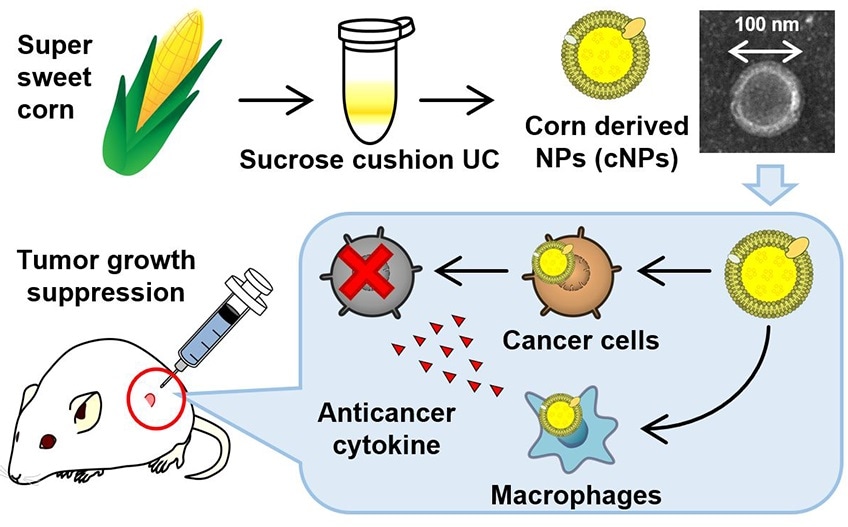Nanomaterials have transformed cancer therapy, and plant-derived nanoparticles have the added benefit of being cost-effective and simple to produce in mass. Tokyo University of Science researchers have recently created novel corn-derived bionanoparticles for specifically attacking cancer cells through an immune method.

An A-maize-ing Anticancer Therapeutic from Corn Plants. Researchers at TUS have developed an edible plant-based nanoparticle that could be the next potent anticancer therapeutic. Image credit: Makiya Nishikawa, Tokyo University of Science
The findings are encouraging, and the technique has been shown to be effective in treating tumor-bearing laboratory mice. Furthermore, no serious side effects were reported in mice so far.
Nanoparticles, or particles with sizes ranging from 1 to 100 nm, have shown promising potential in a wide range of scientific and technological fields, including therapeutics. Traditional, synthetic nanoparticles, on the other hand, are difficult and costly to produce. Extracellular vesicles (EVs), which have surfaced as a viable substitute for synthetic nanoparticles, present challenges in terms of mass production.
Another recently developed option is plant-derived nanoparticles (NPs), which can be conveniently produced in large quantities at a low cost. These nanoparticle-based systems, like EVs, contain bioactive molecules such as polyphenols (known antioxidants) and microRNA, and they can deliver drugs to specific organs in thebodies.
Using this knowledge, scientists from the Tokyo University of Science (TUS) have recently developed bionanoparticles with anticancer activity, employing corn (maize) as the raw material. The results of this study were published online on 24thNovember 2021 in Scientific Reports.
By controlling the physicochemical properties of nanoparticles, we can control their pharmacokinetics in the body; so, we wanted to explore the nanoparticulation of edible plants. Maize, or corn, is produced in large quantities worldwide in its native form as well as in its genetically modified forms. That is why we selected it for our study.”
Makiya Nishikawa, Professor, Tokyo University of Science
Prof. Nishikawa headed the research team in this endeavor.
The researchers made a homogenous solution of super sweet corn inwater, and then centrifuged it at high speed before filtering it through a syringe filter with a pore size of 0.45 μm. The filtered samples were then ultra-centrifuged to acquire corn NPs. The corn-derived NPs (cNPs) had a diameter of about 80 nm. These cNPs also had a tiny net negative charge of -17 mV, which was quite intriguing.
The researchers then conducted experiments to see if these cNPs were being occupied by different types of cells. The cNPs were taken up by various types of cells in a sequence of promising outcomes, including clinically meaningful colon26 tumor cells (cancer cells derived from mice), RAW264.7 macrophage-like cells, and normal NIH3T3 cells.
RAW264.7 cells are frequently used as in vitro screens for immune modulators, which specifically target different cancers mechanisms.
The findings were remarkable: of the three cell types tested, cNPs only substantially inhibited the growth of colon26 cells, implying their preference for carcinogenic cell lines. Furthermore, cNPs successfully induced the release of tumor necrosis factor-α (TNF-α) from RAW264.7 cells.
TNFα is mainly secreted by macrophages, natural killer cells, and lymphocytes—three key components of our highly developed immune system that aid in the mounting of an anticancer reaction.
The strong TNFα response was encouraging and indicated the role of cNPs in treating various types of cancer.”
Dr Daisuke Sasaki, Study First Author, Instructor and Researcher, Tokyo University of Science
The researchers then performed a reporter test using the enzyme “luciferase” (obtained from fireflies), which is a sensitive reporter used to study various biological reactions. This luciferase-based assay showed that the potent combination of cNPs and RAW264.7 cells completely suppressed colon26 cell proliferation.
Ultimately, the researchers looked at how cNPs affected laboratory mice with subcutaneous tumors. Again, the findings were astounding: daily injections of cNPs into colon26 tumors substantially suppressed tumor growth while causing no severe side effects or losing weight.
“By optimizing nanoparticle properties and by combining them with anticancer drugs, we hope to devise safe and efficacious drugs for various cancers,” observes Professor Nishikawa.
As a conclusion, Dr. Kosuke Kusamori, co-author and assistant professor at TUS says, “These cNPs exhibit excellent anti-tumor properties, are easy to develop, and are economically viable. Moreover, they do not exhibit any serious adverse effects, at least in mice so far!”
Indeed, this could be the anti-cancer therapy of tomorrow; TUS has made an incredibly a-maize-ing discovery!
Source:
Journal reference:
Sasaki, D., et al. (2021) Development of nanoparticles derived from corn as mass producible bionanoparticles with anticancer activity. Scientific Reports. doi.org/10.1038/s41598-021-02241-y.